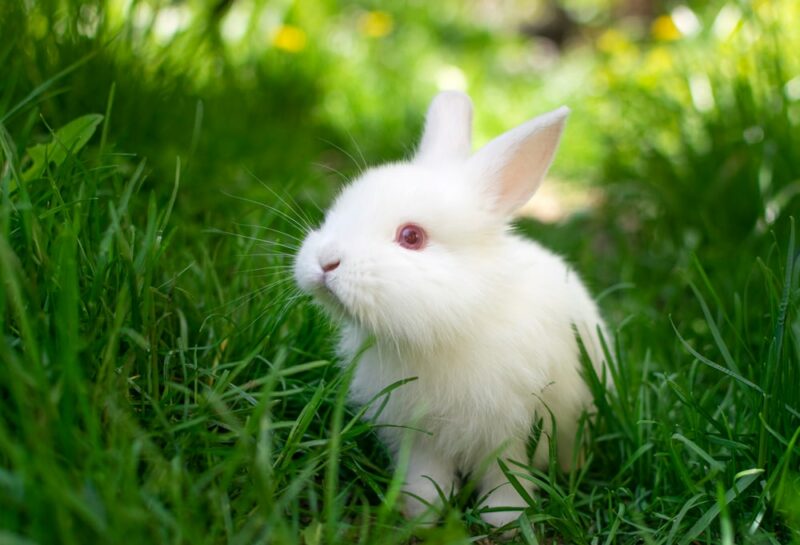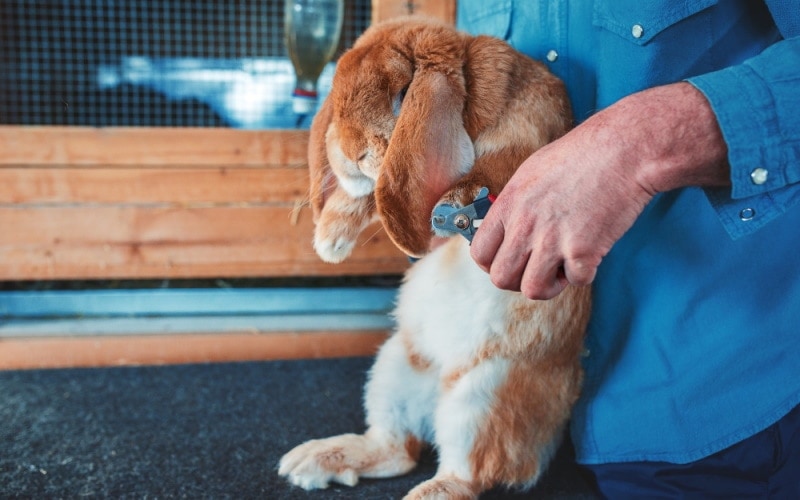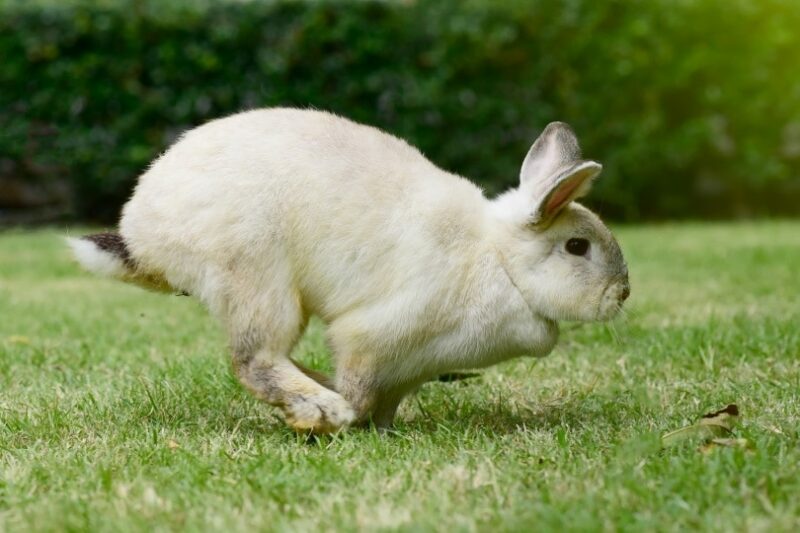Do Rabbits Have Periods? Vet-Approved Reproduction Facts
Updated on
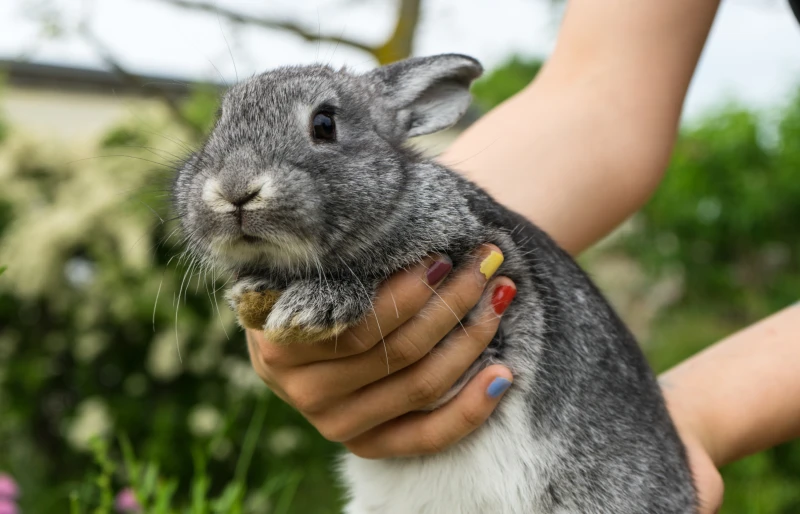
Click to Skip Ahead
Mammals are warm-blooded and most give birth to live young. Female rabbits are no exception and give live birth to litters of baby rabbits. But have you ever wondered if rabbits also menstruate like humans?
Female rabbits do not have periods because they are induced ovulators, which means they only ovulate during or shortly after mating.
Let’s discuss how rabbits reproduce and which mammals do have periods.
What Exactly Is Induced Ovulation?
Female rabbits, also known as does, experience induced ovulation, which means the eggs release during copulation or shortly after. It’s also been reported that some does have ovulated just by being close to a male rabbit (also known as a buck).
Basically, female rabbits don’t go through cyclical ovulation like humans. Humans generally have a 28-day cycle for menstruation, but rabbits will only ovulate under the right conditions and usually when stimulated by sexual activity.
This means ovulation can occur at any time, so rabbits can reproduce throughout the year. Does can also conceive within 24 hours after they have given birth, hence the saying, “breeding like rabbits.”
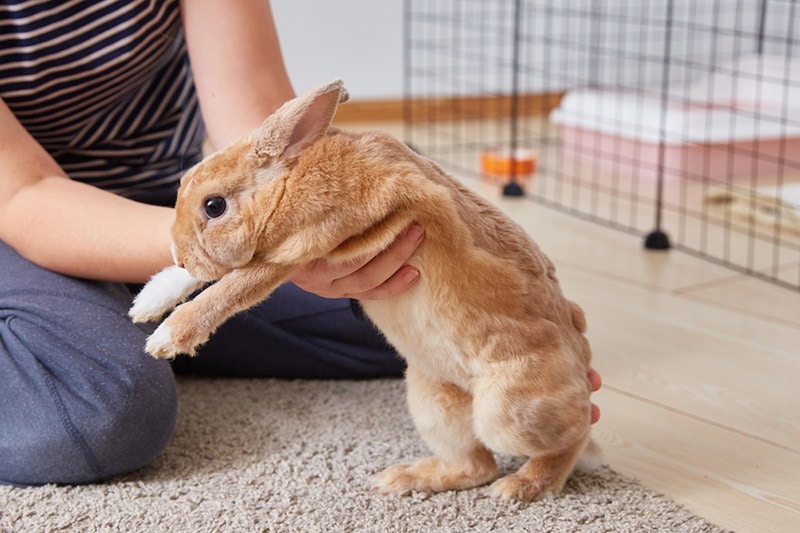
Why Might Female Rabbits Bleed?
Since female rabbits don’t menstruate, you should know that it isn’t normal for a doe to randomly have blood at the vulva.
1. Blood in the Urine
One reason for a rabbit bleeding might be blood in the urine, which is called hematuria 1.
- Bladder infection
- Kidney stones
- Uterine cancer
- Cystitis
- Polyps
- Abortion
If you suspect that your rabbit has blood in their urine, you should see your vet. Conditions that cause this require veterinary help for diagnosis and effective treatment.
2. Red Urine
Strange as it might sound, rabbits have been known to have red urine, which is normal. It’s actually more common than blood in the urine.
Rabbit urine can range from almost clear or brown to orange or even deep red.
- Broccoli
- Dandelions
- Cabbage
- Fir leaves
- Carrots
- Spinach
Almost any vegetable that contains beta-carotene can cause red urine, particularly if your rabbit isn’t accustomed to eating those veggies.
- Being on antibiotics
- Dealing with the first cold snap in autumn
If your rabbit is eating, drinking, and pooping normally and seems to be acting the way that they usually do, chances are that they are fine. To help differentiate blood from pigment look for other clues. Blood in the urine may form blood clots or be a bit of blood surrounded by normal-colored urine. Your rabbit may also be passing small amounts of urine, little and often or straining to urinate.
Monitor your rabbit’s urine, and speak to your vet if you need any advice. Take your rabbit in for medical help if they don’t seem well.
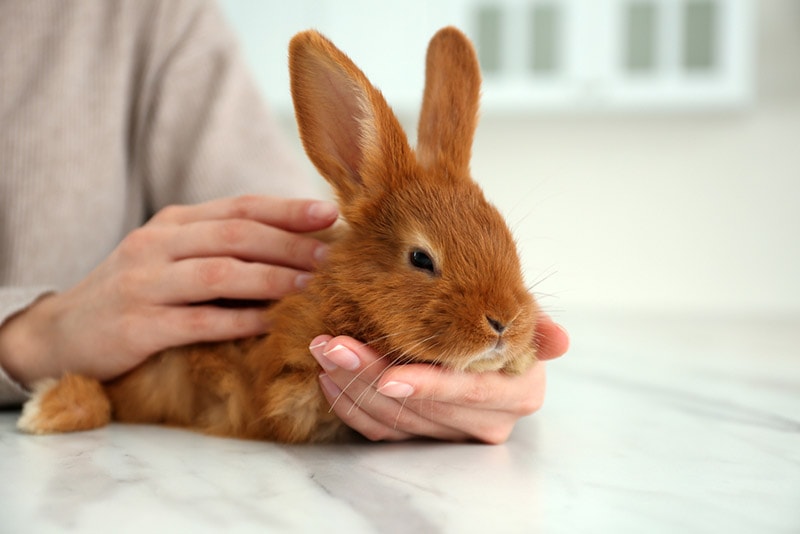
3. Bleeding
If you notice blood on your rabbit, take a closer look at them. If you see any lacerations, especially if it’s deep or you can’t find what is causing the bleeding, take them to your veterinarian.
Rabbits won’t necessarily exhibit any signs of pain or discomfort even if something is wrong, but you might notice a change in their behavior. Either way, speak to your vet if you’re at all concerned.
How Does Reproduction Work in Female Rabbits?
Rabbits become sexually mature at different times, depending on their size:
| Small rabbits: | 3 ½ to 4 months old |
| Medium to large rabbits: | 4 to 4 ½ months old |
| Giant breeds: | 6 to 9 months of age |
Receptivity
Does are sexually receptive about every 14 to 16 days and when their genitalia are moist and purplish red. A doe that is not receptive will have paler pink genitalia with little moisture.
Since rabbits don’t give too many physical signs of sexual reception, you have to go by their age. A receptive female rabbit will also show other behavioral signs:
- Being more restless and active than usual
- Seeking the company of other rabbits
- Flattening out and raising her tail when touched
These signs, in addition to the changes in the vulva, clearly indicate that your doe is receptive to mating.
It is recommended that rabbits are sterilized before they become sexually mature so that no unwanted litters come about.

Mating
If sexually mature bucks and does are housed together they will usually mate regularly. This is why it is not recommended that rabbits that have not been sterilized are kept together.
Gestation
Does gestate an average of 32 days, but a rabbit might need her labor induced if she hasn’t had her litter by day 33. Otherwise, the litter might not survive beyond day 34.
If you are fostering a pregnant rabbit you can add a nest box to your rabbit’s habitat on day 28 or 29. The doe will pull fur from her own body to line the box, in preparation for her upcoming birth. You should not interfere with a doe and her newborn kits.
The Litter
The average sized litter is about seven to eight kits, though medium to large rabbits can give birth to 12 or more kits. They are born naked, deaf, and blind. Their ears and eyes start to open by the time they are 10 days old. The kits are weaned by 4 to 5 weeks of age.
Which Mammals Have Periods?
Most mammals do not menstruate. Rabbits are induced ovulators, as are cats, ferrets, and camelids (camels, llamas, alpacas, vicuñas, and guanacos). Others are primarily spontaneous ovulators and include mice, rats, horses, sheep, pigs, guinea pigs, monkeys, and humans.
Other than humans, the majority of mammals do not menstruate. That said, there are a handful of species that do get periods:
| Primates: |
Not all primates menstruate, but great apes, such as the chimpanzee, orangutan, bonobos, and gorillas; lesser apes, such as gibbons and siamangs; and Old World monkeys, such as vervets, baboons, macaques, patas, and mangabeys, all menstruate.
|
| Elephant shrew: |
They are native to Africa and are also known as sengi, or the jumping shrew. They only menstruate at the end of the breeding season.
|
| Cairo spiny mouse: |
Another native of Africa, the spiny mouse undergoes a brief menstrual cycle and the hormonal changes that come with it.
|
| Bats: |
Only four species of bats have menstrual cycles, which are the Seba’s short-tailed, Pallas’s long-tongue, black mastiff, and wild fulvous fruit bats.
|
Conclusion
A female rabbit’s reproductive process does not include menstruation, but they can become pregnant at almost any time!
So, if you notice any blood on or near your doe, you should give her a quick physical check. If you don’t know the cause and are sure that it isn’t red urine (different from blood in the urine), take your bun to your vet immediately.
Featured Image Credit: Cora Mueller, Shutterstock



